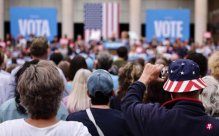Source: Bloomberg
Author: ye xie
After pushing the US Treasury yield for several weeks to rise, traders have reduced betting chips before the US election, because they are unwilling to give up bonds in the case of two candidates' equalization situation.
Reducing betting has become the recent market theme: speculators have settled US Treasury futures positions, and a much -watched survey of JP Morgan Chase showed that its US debt customers cut bulls and short positions.At the beginning of an important week, Wall Street promoted the various situations where the bond market might make after the election. The information passed by the market is not strong confidence around the future road.
Traders are almost certain that the Fed will cut interest rates at 25 basis points on Thursday, but in addition, the prospect of entering 2025 depends on the election results of the president and Congress, which will affect the tax from tariffs to tariffs and even the Federal Reserve.The position of the next few years.
"Low confidence in the results of the election," said Angelo Manolatos, an interest rate strategist of Wells Fargo Securities."It means that investors reduce adventure."
For investors who plan to move next, another complex problem is that Wall Street is making a completely different forecast on the future prospects.
strategists agreed that if the Republican party swept the opponent, bond holders were undoubtedly painful, and they had just experienced the largest monthly decline in the past two years.
Under the expected situation of the Republican Party Control Congress and Donald Trump's re -entering the White House, the market is expected to implement tax cuts and tariff plans to expand federal deficit and re -ignition inflation.
There are more and more speculations about this result, coupled with signs of economic and toughness, helping to promote the 10 -year national bond yield to reach four months before the election, close to 4.4%.
If the bond plunge in October was caused by betting on the Republican Party's victory, then if Kamala Harris finally won, it may ignite the rebound momentum.
Barclays strategist said that if Harris wins and the Republican Party won a parliament or the two houses, it will cause bonds to strengthen the bond, because this will eliminate the risk of new tariffs and the significant risk of deficit.This will also bring a good risk of bonds, and fiscal cliffs may promote the 10 -year Treasury yields to fall up to 25 basis points.
It is not clear how the market will develop in the context of other elections.The challenge comes from two aspects. One is to eliminate the impact of various policy portfolios on the market, and the other is to figure out which factors have digested.
Deutsche Bank Securities strategist predicts that in the case of Trump's victory and Congress belongs to the two parties, the yield will fall across the board, partly due to financial stimulus measures.However, Barclays' research shows that if the Republican Party has the ability to implement tariff policies, but it is difficult to obtain the tax reduction bill in Congress, it will push a short -term yield and long -term return will not be affected.
If the Democratic Party has won great victory, the Wells Fargo strategist expects that the government will increase expenditure in this situation to increase the yield.RBC Capital said that this situation is the most conducive to bonds, because this will lead to corporate taxes, exacerbate the "not conducive to enterprise" environment, and weaken risk preferences.
Matthew Raskin, director of interest rate research at Deutsche Bank Securities, said that in the final analysis, a problem is that it is almost impossible to predict how the market will respond.
"Even if we know what policies are going to implement, these policies -especially tariffs -we are quite uncertain on the impact of financial markets including interest rates," he said.
Investors seem to be the only highly convinced that the bond market will be turbulent.
ICE's Bank of America's fluctuation index has risen to the highest level in a year, much higher than the level before the 2020 and 2016 elections.
Vishwanath Tirupattur, chief fixed income strategist of Morgan Stanley, said he was waiting for the risk of the event to pass before taking action.




